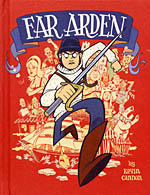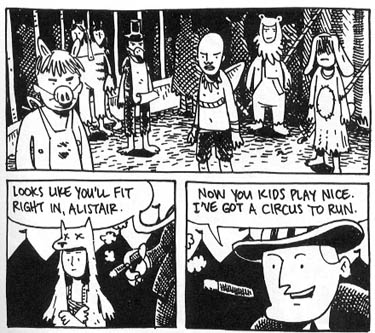 By Kevin Cannon
By Kevin Cannon
384 pages, black and white
Published by Top Shelf Productions
Do you ever feel like you’ve been faked out by a book’s presentation? I certainly did with Kevin Cannon’s Far Arden. Somehow along the way I’d mistakenly got the impression that Far Arden was a light-hearted, full-of-fun, slightly-silly adventure story. To be fair, there are certainly vast portions of the book that qualify with that description. But as the hunt for the mythical Arctic paradise of Far Arden develops, it’s only a matter of time before you start realizing that this book is definitely not all laughs and giggles.
 The book certainly starts on a light, jokey note as noted pirate Shanks and his partner in crime Hafley try and steal back Shanks’s old boat the Areopagitica. Hafley and Shanks’s dialogue as it goes back and forth is not entirely serious, and even when the action kicks in and Shanks goes up against two members of the Royal Canadian Arctic Navy, there’s an element of fun about it. For quite a while, that’s the tone that Cannon takes with the story. From Shanks’s picking up of an orphan who starts playing with the "puppy blankets" that he finds in the boat’s hold, to the "who’s capturing whom?" flip-flops of Hafley’s fortune, it’s a cute and slightly silly story. Divided up into chapters, you can even use Cannon’s divisions as an effective serial adventure, reading one chapter a day and seeing how the characters get out of their latest spot.
The book certainly starts on a light, jokey note as noted pirate Shanks and his partner in crime Hafley try and steal back Shanks’s old boat the Areopagitica. Hafley and Shanks’s dialogue as it goes back and forth is not entirely serious, and even when the action kicks in and Shanks goes up against two members of the Royal Canadian Arctic Navy, there’s an element of fun about it. For quite a while, that’s the tone that Cannon takes with the story. From Shanks’s picking up of an orphan who starts playing with the "puppy blankets" that he finds in the boat’s hold, to the "who’s capturing whom?" flip-flops of Hafley’s fortune, it’s a cute and slightly silly story. Divided up into chapters, you can even use Cannon’s divisions as an effective serial adventure, reading one chapter a day and seeing how the characters get out of their latest spot.
As Far Arden progresses, though, the book starts to pick up a more serious tone. Supporting characters start dying, in sudden and almost random moments that will take most readers by surprise. We start learning about the darker side of some of our heroes, and learn they aren’t all they presented at first. The first half of Far Arden seems so warm and inviting that it almost seems strange that people would be looking for a mythical tropical island in the Arctic Circle. The further you get into the book, though, the more you find yourself feeling Nunavut’s chills and bleak landscapes, and begin to understand the attraction of Far Arden. It’s more than just a physical escape, it’s a refuge from the bleak world that surrounds it. The desperation of heroes and villains alike trying to find Far Arden becomes that much clearer and compelling.  That said, it’s hard to avoid the large white elephant in the room, the conclusion of Far Arden. Even with some of the grimmer material up until this point, it feels wildly out of place. I don’t have a problem with an unhappy ending of a book, but this seems to still come out of nowhere with such a vengeance that it left me reeling.
That said, it’s hard to avoid the large white elephant in the room, the conclusion of Far Arden. Even with some of the grimmer material up until this point, it feels wildly out of place. I don’t have a problem with an unhappy ending of a book, but this seems to still come out of nowhere with such a vengeance that it left me reeling.
Cannon’s art reminds me a bit of Marc Hempel’s work on books like Tug & Buster, with crisp black and white art that doesn’t go overboard on details. Instead, he takes his time working on the little things that make his art a lot of fun. Over-the-top sound-effects (who knew a headlock involved a sound?) and large, thick lettering that makes the comic feel a little more back-to-basics in a good way. The smaller dimensions of the book help Cannon’s art as well, I think; everything feels slightly more compact and tight, letting the dark shadows come together and congeal on the page. With no shading or half-tones in Far Arden, Cannon has to rely on nothing but the absolute basics of black and white to provide texture and depth, but I think it comes across well.
Far Arden is a peculiar book, when it’s all said and done. Was it a satisfying read? Definitely. There’s no denying, though, that the book zooms from one extreme to the other; you can almost see Cannon hitting a point in the narrative where he’s changed his mind about what he wants Far Arden to be and goes about shifting it into another form entirely. I’m curious to see what he’ll do next, although I must admit that I hope his next book decides a bit earlier just what tone it’s planning on shooting for. A lot of readers are going to feel stung by the end of Far Arden.
Purchase Links: Amazon.com | Powell’s Books
